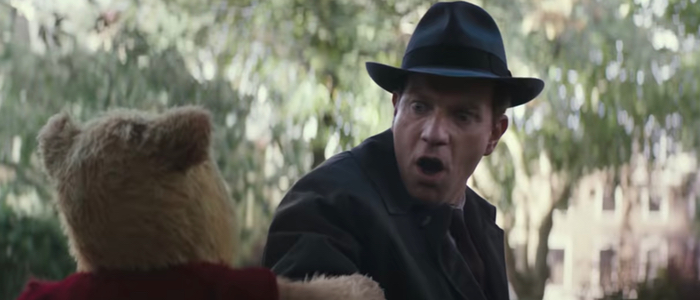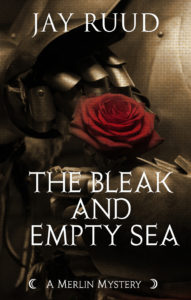Christopher Robin
Marc Foster (2018)
[av_image src=’http://jayruud.com/wp-content/uploads/2014/08/Susanns.jpg’ attachment=’78’ attachment_size=’square’ align=’left’ animation=’left-to-right’ link=” target=” styling=” caption=’yes’ font_size=10” appearance=’on-hover’]
2 JACQUELINE SUSANNS
[/av_image]
If you go to see Disney’s live-action Christopher Robin, you’ll see some interesting “coming attractions,” one of which is for the upcoming Mary Poppins Returns, a sequel 55 years in the making, that looks quite promising with the practically perfect Emily Blunt in the lead and Broadway’s Lin-Manuel Miranda, the genius behind the juggernaut that is Hamilton, in the equivalent of a Dick Van Dyke type role. The odds are pretty good that that film, like its original, will stress the theme of rejecting the daily grind of striving for more in favor of the childlike appreciation for simple joys, for taking time to smell the flowers and such like. This is also the theme of Christopher Robin, whose title character used to cavort about in the Hundred Acre Wood with Winnie the Pooh, Tigger and Eeyore, but has now grown up and forgotten everything that once made him happy. He’s become a kind of Mr. Banks and, like Banks, needs to reconnect with those things that make life worth living. It’s not a bad theme, I suppose, but you’d probably do better to watch the original Mary Poppins on Netflix or Hulu, or perhaps take your chances on the sequel when it comes out at Christmas. You might be disappointed in the current fare.
Another coming attraction you’ll see at this movie is for Disney’s new live-action Dumbo, the next big reimagining of a favorite animated classic. What with the significant advances in CGI effects, some of those crazy cartoon incidents, like flying elephants, can now be turned into live-action scenes, giving more of a sense of realism to the fantasy of animation. I’m not sure that’s necessarily a good thing, but it seems to have worked pretty well with The Jungle Book. Beauty and the Beast, however, suffered in the translation, to my way of thinking, losing much of its magic in the conversion to flesh-and-blood Beauty, Beast, and household appliances. How Dumbowill fare remains to be seen, but in the case of Winnie the Pooh, I think it can be said that just because you can turn an animated movie into live action doesn’t mean you always should.
When the animated bear and tiger and donkey turn into actual stuffed animals that get dragged around through the woods and the water and get their paws and feet dipped in sticky honey, it’s really more disturbing than cute, because you’re not really going to have your kid play with a honey-drenched stuffed bear, are you? Really? And there’s no magical phenomenon going on in the Pooh stories that can be better presented through CGI than through animation. It’s just the quiet interactions of a kid and his toys. I have a feeling that if Disney decided to turn Toy Story into a live action feature, it would just be creepy, not enchanting.
Speaking of the quiet interaction of a kid and his toys, I will admit that, in the furor and noise of the summer action blockbuster season, a small, quiet movie that has nothing to do with saving the world from destruction or from evil or from bombs or from intergalactic villains can be a refreshing change of pace, and the quiet humor of the original Winnie the Pooh films can be a kind of haven against the encroaching sound and fury of the rest of the world. I remembered, sitting in the audience of this film, taking my daughter to Disney’s first Winnie the Pooh film forty years ago, the first movie I took her to as a special entertainment while her mother stayed home with her new baby brother. It delighted the 3-year-old’s imagination in a way I don’t think the current live-action film would be able to duplicate. In the interest of full disclosure, I feel compelled to reveal that I fell asleep in the film, finding little to delight or excite me in the “real-world” relationships portrayed.
The story of Christopher Robin begins with a prologue in which the young Christopher (a strangely emotionless Orton O’Brien) solemnly has a last adventure with all of his childhood animal friends before he is packed off to a solemn boarding school on his way to a solemn adulthood. As he enters adolescence, his father apparently dies, and eventually he marries Evelyn (Hayley Atwell from The Duchess and Captain America: The First Avenger), the love of his life, and has a daughter with her, Madeline (ultimately played by a charming Bronte Carmichael from Darkest Hour). Christopher fights in the second World War with the rest of Britain, and comes home to Evelyn and Madeline.
That is all exposition and is shown us in quick vignettes before the main action of the film begins. This is set in post-war Britain, and the adult Christopher (Ewan McGregor) is employed in middle management at the Winslow Luggage company in London, which is losing money daily because, what with the shortages in post-war Britain, nobody can afford to take vacations any more. As a result, Christopher is in a constant state of anxiety and works long hours trying to cut costs and increase profits in the business. Of course, he neglects his marriage and his daughter, and when he does pay any attention to Madeline, reading her a bedtime story, he ignores her request for an actual story and reads to her from a school text on Victorian society. No frippery for her!
Even when the family has planned to take a short holiday in the country, Christopher is forced to cancel because his overbearing boss Giles (Mark Gatiss, Mycroft of television’s Sherlock) insists that Christopher work all weekend to decide which twenty employees to let go, or to find an alternative solution to the company’s financial woes. Wife and daughter go off without him, and it is into the midst of this morose state of affairs that Christopher’s old chum Winnie the Pooh drops—awakened from his long hibernation in Christopher’s imagination, apparently, by Madeline’s finding one of his old drawings and asking him about them. Pooh, who has awakened in the Hundred Acre Wood and failed to find any of his old friends there, has come to get Christopher Robin to help him find them (they are, like Pooh, apparently dormant in Christopher’s imagination, and Christopher’s return to the wood is a psychological return. That’s for the adults in the audience. For the kids, it’s just regular magic).
I can’t say any more about the plot, since anything further might be considered a “spoiler,” but the truth is I probably don’t have to, since you can likely see where this is all leading. Believe me, there are no surprises. Unless I slept through them. We might have expected a little less cliché of a script from writers Alex Ross Perry (Nostalgia), Tom McCarthy (Spotlight), and Allison Schroeder (Hidden Figures)—based on a story by Mark Steven Johnson (Grumpy Old Men) and Greg Brooker (Stuart Little)—but then, this could simply be a case of too many cooks. And the solemn, brooding tone of the film, which seems so inappropriate for a movie probably intended for children like my 3-year old daughter (or maybe her 4-year-old twins), may be the result of Marc Forster’s direction, whose films (Monster’s Ball,Quantum of Solace, World War Z), are not known for their light and airy touch.
Sure, McGregor is fine in his role, and shows a believable arc moving from dull workaholic to delighted friend of talking animals. And Carmichael is quite watchable as the constricted heir of Christopher’s imagination but they don’t really save the film. The voices, particularly of Jim Cummings as Winnie the Pooh and Tigger, and Brad Garrett as Eeyore, are often quite entertaining as well, and there are even moments of high humor, as when Christopher, in response to Pooh’s explanation of how he got to London, says “That’s a silly explanation,” and Pooh answers, “Why, thank you!”
But in the end, the film does not deliver on its promise. It needs more joy and less funk. It needs less live action and more animation. I’m giving this one two Jacqueline Susanns.
NOW AVAILABLE:
If you like these reviews, you might enjoy Jay Ruud’s most recent novel, now available from the publisher at https://encirclepub.com/product/the-bleak-and-empty-sea/. Also available from Amazon or Barnes and Noble.
When word comes to Camelot that Sir Tristram has died in Brittany of wounds suffered in a skirmish, and that his longtime mistress, La Belle Isolde, Queen of Cornwall, has subsequently died herself of a broken heart, Queen Guinevere and her trusted lady Rosemounde immediately suspect that there is more to the story of the lovers’ deaths than they are being told. It is up to Merlin and his faithful assistant, Gildas of Cornwall, to find the truth behind the myths and half-truths surrounding these untimely deaths. By the time they are finally able to uncover the truth, Gildas and Merlin have lost one companion and are in danger of losing their own lives.
Order from Amazon here: https://www.amazon.com/Bleak-Empty-Sea-Tristram-Mystery/dp/1893035735/ref=sr_1_1?s=books&ie=UTF8&qid=1503328086&sr=1-1&keywords=Bleak+and+Empty+Sea
Order from Barnes and Noble here: https://www.barnesandnoble.com/w/the-bleak-and-empty-sea-jay-ruud/1126958139?ean=9781893035737



The best line of all: “Believe me, there are no surprises. Unless I slept through them.”